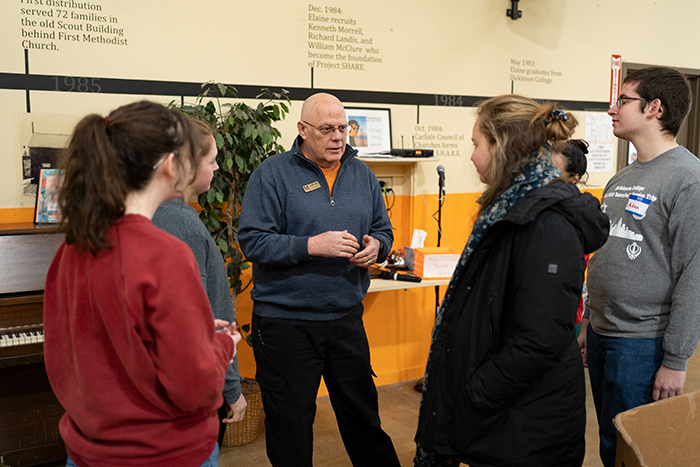Dickinson Alumnus Leads Local Efforts to Feed Food-insecure Families Amid COVID-19 Emergency

Bob Weed '80 speaks with student volunteers at the Project SHARE food bank in February 2020. Photo by Joe O'Neill.
As the COVID-19 coronavirus pandemic unspools, Dickinsonians are stepping up to the plate to help the most vulnerable. If you know of any Dickinsonians helping out during this crisis, let us know in an email to stories@dickinson.edu.
Dickinson alumnus leads local efforts to feed food-insecure families amid COVID-19 emergency
by MaryAlice Bitts Jackson
As businesses, community organizations and schools close their doors in response to the COVID-19 coronavirus pandemic, a growing number of Americans are food insecure, some for the very first time. Dickinson alumni like Bob Weed ’80 are there to help.
Weed is CEO of Carlisle-based food bank Project SHARE, and he’s devoted his adult life to civic engagement. He’s one of the many Dickinsonians stepping up to help those most affected by the COVID-19 pandemic.
Called to give back
The son of the late Bob and Florence Weed, who graduated from Dickinson’s class of 1952, Weed majored in political science and psychology; he also played football and rugby and was a member of Sigma Chi. After earning an MBA at American University, Weed returned to Central Pennsylvania, where he and his wife, Vicki, have raised two children as he forged a 35-year career in banking.
As he led teams of branch bankers—his psychology degree came in handy here!—Weed also forged relationships among his workplaces and community businessowners and nonprofit organizations. That work introduced him to community leaders and led him to volunteer with numerous organizations, including service on many local and regional boards.
“I’m called, through my faith, to help people in need, so it’s something that’s always been part of me,” says Weed, a practicing Presbyterian. “And after I got involved with the United Way early in my career, I learned more about key community issues, and I saw the impact that nonprofit and community organizations can have.”
In 2014, Weed joined the board at Project SHARE, founded by fellow alum Elaine Livas ’83, which works with congregations, civic organizations and businesses to provide basic assistance to more than 1,000 families each month. After volunteering as treasurer for three years, Weed was tapped as Project SHARE’s interim CEO. He’s been CEO since 2018.
COVID-19: Greater need, fewer resources
As the pandemic unfolds, Weed’s deep leadership experience, close community ties and creative problem-solving skills are in full view.
Typically, Project SHARE provides healthy, soup-to-nuts meals to 830 families once a month at its North Orange Street warehouse—owned by Dickinson and made available to the nonprofit rent-free—and also accommodates roughly 800 visits to its farm stand on Lincoln Street. The organization additionally works with community organizations like Salvation Army and Community CARES to help meet the needs of the local homeless population. Project SHARE relies on monetary and food donations from suppliers that include local grocery retailers as well as the Dickinson College Farm and benefits from fundraisers, including Empty Bowls, hosted at Dickinson.
Last week, Project SHARE served double its usual number of farm-stand families, and Weed anticipates a 100- to 200-family increase at the warehouse this month. Those numbers are expected to climb exponentially in coming weeks, while at the same time grocery stores have less surplus food to donate, as consumers stock up on pantry and frozen items and cook more meals at home (one retailer donated 50 pounds of produce and bread last week instead of its usual 600). So Project SHARE is buying most of its food now—even as two of its major fundraisers are canceled.
There are also new logistical and health challenges. In mid-March, Project SHARE completely reconfigured its operations to comply with CDC and Pennsylvania Department of Health social-distancing and sanitizing guidelines—and reconfigured again, on a dime, when those guidelines changed. It now runs a drive-through operation. Because the majority of his volunteers are retired—the age group most vulnerable to dangerous effects of the coronavirus—and other volunteers, like Dickinson students, are also unavailable, Weed shored up the ranks by recruiting Carlisle School District teachers and staff, now unable to work, as the schools are closed.
“It’s just a whole new world, now,” says Weed. “We’re having to think critically and act fast, as the situation develops.”
Weed consults regularly with fellow community leaders, including those in the Northside Neighborhood Community Action Network, of which Dickinson is a founding member, and works with the Center for Civic Learning & Action. He’s reaching out to find additional sources of food donation and funding, and he’s committed to doing everything he can to meet the needs of fellow community members—both in this challenging time and beyond.
“There’s a need in Carlisle, and there’s a spirit in Carlisle that go hand in hand. It’s inspiring how people turn out to help,” he says. “I’ve been here three years now, and when I see what volunteers from the community do to help others they don’t know and what our clients do to help each other despite the challenges they face, I’m humbled every single day.”
How You Can Help
Project SHARE food pantry areas of great need:
- Monetary and food donations (particularly fresh produce)
- Volunteers
- Sanitation and sterilizing supplies (hand sanitizer, Lysol wipes, etc.)
Read more stories about how members of the Dickinson community near and far have responded to emerging needs and challenges during the coronavirus pandemic.
TAKE THE NEXT STEPS
Published April 2, 2020